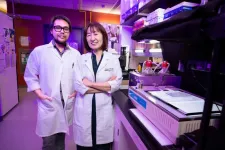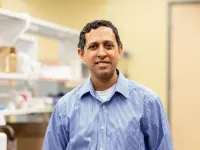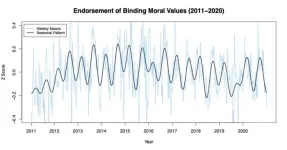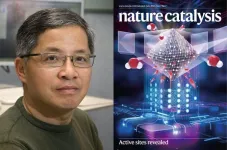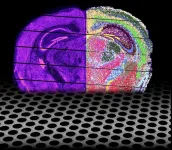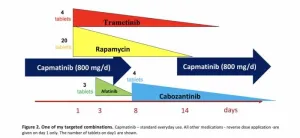(Press-News.org) Sometimes you just can’t win, and that goes double for people navigating the increasingly polarized political landscape in the United States.
Having nuanced opinions of politics in the U.S. turns out to be a very lonely, and unpopular, road, according to a recent study from a research team that includes assistant professor Aviva Phillipp-Muller from Simon Fraser University’s Beedie School of Business.
Published in the Journal of Experimental Social Psychology, the study found that people who express ambivalence about political topics – ranging from COVID-19 mask mandates, immigration and the death penalty – were not only disliked by people who disagreed with their view, but they also were less liked by people who agreed with their overall position but feel their position isn’t strong enough.
“The study exposes a mismatch between expectation and social reality,” says Aviva Phillipp-Muller. “Taking a nuanced position on political issues and coming to a middle ground might seem like a sensible way to bridge political divides, which is what participants in our study expected, but the reality is political polarization has turned those kinds of stances into a social disincentive.”
Phillipp-Muller was part of team of researchers from the University of Virginia Darden School of Business, DePaul University and Ohio State University that surveyed more than 1,000 Americans on their opinions of several political issues and measured their agreement with different pro- and con- arguments on the issue to assess what side they fell on and if they were more or less ambivalent towards those views.
According to the study, ambivalence does not preclude people from taking an overall position on one side or another, but is determined when people can accept points to both sides of an argument or do not wholeheartedly agree with all supporting points for a position.
The research team ran an experiment looking at what people thought of those with different political opinions.
Contrary to participants’ expectations, people expressing ambivalence about political issues can undermine how well a person is liked, to the point of sharing nuanced opinion being a social risk.
Not only were ambivalent people disliked more by those who had different political opinion as them, they also proved to be unpopular with people who largely held the same beliefs.
For example, people might view ambivalent targets as lacking conviction or undermining their side’s ability to pursue important political goals (in other words, “win”) without compromise.
The study offers insight in the interpersonal dynamics of political polarization and the ramifications could be chilling.
The authors say that while people who hold nuanced opinions might think their measured take might be well-received by others, they could actually experience social costs that deter them from expressing their views.
This, the study warns, could leave “the political arena to more extreme actors on all sides.”
“We are next hoping to look at whether nuance ever leads to social benefits,” says Phillip-Muller. “For example, outside of political domain, when talking about brand preferences or other personal choices, can there ever be an upside to expressing ambivalence?”
AVAILABLE SFU EXPERTS
AVIVA PHILLIPP-MULLER, assistant professor, marketing, Beedie School of Business
aviva_philipp-muller@sfu.ca
CONTACT
MATT KIELTYKA, SFU Communications & Marketing
236.880.2187 | matt_kieltyka@sfu.ca
Simon Fraser University
Communications & Marketing | SFU Media Experts Directory
778.782.3210
ABOUT SIMON FRASER UNIVERSITY
Who We Are
As Canada’s engaged university, SFU works with communities, organizations and partners to create, share and embrace knowledge that improves life and generates real change. We deliver a world-class education with lifelong value that shapes change-makers, visionaries and problem-solvers. We connect research and innovation to entrepreneurship and industry to deliver sustainable, relevant solutions to today’s problems. With campuses in British Columbia’s three largest cities—Vancouver, Burnaby and Surrey—SFU has eight faculties that deliver 364 undergraduate degree programs and 149 graduate degree programs to more than 37,000 students. The university now boasts more than 180,000 alumni residing in 145+ countries.
END
No room for nuance in polarized political climate: SFU study
2024-08-06
ELSE PRESS RELEASES FROM THIS DATE:
What happens to your brain when you drink with friends?
2024-08-06
EL PASO, Texas (Aug. 6, 2024) – Grab a drink with friends at happy hour and you’re likely to feel chatty, friendly and upbeat. But grab a drink alone and you may experience feelings of depression. Researchers think they now know why this happens.
“Social settings influence how individuals react to alcohol, yet there is no mechanistic study on how and why this occurs,” said Kyung-An Han, Ph.D., a biologist at The University of Texas at El Paso who uses fruit flies to study alcoholism.
Now, Han and a team of UTEP faculty and students have taken a key step in understanding the neurobiological process behind social drinking and how it boosts ...
University of Houston researchers create new treatment and vaccine for flu and various coronaviruses
2024-08-06
A team of researchers, led by the University of Houston, has discovered two new ways of preventing and treating respiratory viruses. In back-to-back papers in Nature Communications, the team - from the lab of Navin Varadarajan, M.D. Anderson Professor of William A. Brookshire Chemical and Biomolecular Engineering - reports the development and validation of NanoSTING, a nasal spray, as a broad-spectrum immune activator for controlling infection against multiple respiratory viruses; and the development of NanoSTING-SN, a pan-coronavirus nasal vaccine, that can protect against infection and disease by all members of the coronavirus family.
NanoSTING ...
People's moral values change with the seasons
2024-08-06
A new UBC study has revealed regular seasonal shifts in people’s moral values.
The finding has potential implications for politics, law and health—including the timing of elections and court cases, as well as public response to a health crisis.
The research published this week in Proceedings of the National Academy of Sciences (PNAS) analyzed survey responses from more than 230,000 people in the U.S. over 10 years and revealed that people’s embrace of certain moral ...
Researchers reveal atomic-scale details of catalysts’ active sites
2024-08-06
The chemical and energy industries depend upon catalysts to drive the reactions used to create their products. Many important reactions use heterogeneous catalysts — meaning that the catalysts are in a different phase of matter than the substances they are reacting with, such as solid platinum reacting with gases in an automobile’s catalytic converter.
Scientists have investigated the surface of well-defined single crystals, illuminating the mechanisms underlying many chemical reactions. However, there is much more to be learned. For heterogeneous catalysts, their 3D atomic structure, their chemical composition and the nature of ...
The prescription for a healthier democracy
2024-08-06
When we’re sick, the first step on the road to recovery is a visit to the doctor’s office.
It turns out the same may also be true for breathing life into America’s democracy.
A Rutgers University–New Brunswick study published in the journal JAMA Health Forum finds that physicians can play a crucial role in strengthening political inclusion of marginalized groups by aiding patients in voter registration.
“Hospitals aren’t the first place we think of when it comes to voter registration,” said Katherine McCabe, an associate professor of American politics at Rutgers University-New Brunswick and lead ...
New substrate material for flexible electronics could help combat e-waste
2024-08-06
Electronic waste, or e-waste, is a rapidly growing global problem, and it’s expected to worsen with the production of new kinds of flexible electronics for robotics, wearable devices, health monitors, and other new applications, including single-use devices.
A new kind of flexible substrate material developed at MIT, the University of Utah, and Meta has the potential to enable not only the recycling of materials and components at the end of a device’s useful life, but also the scalable manufacture of more ...
Johns Hopkins Medicine scientists probe molecular cause of COVID-19 related diarrhea, revealing potential treatments
2024-08-06
Working with human stem cells that form a kind of “mini intestine-in-a-dish,” Johns Hopkins Medicine scientists say they have found several molecular mechanisms for COVID-19-related diarrhea, suggesting potential ways to control it.
Details of the experiments in a model of human intestinal tissue, called enteroids, are described on July 30 in Cellular and Molecular Gastroenterology and Hepatology.
Along with the unpleasant aches, fever, sore throat, cough, respiratory distress and other symptoms that may accompany COVID-19 infection, up to half of people who get the virus will experience diarrhea. Some 30% of them will go on to develop ...
New open-source platform for high-resolution spatial transcriptomics
2024-08-06
Leuven, 6 August 2024 - A team of researchers from the lab of Prof. Stein Aerts (VIB-KU Leuven) presents Nova-ST, a new spatial transcriptomics technique that promises to transform gene expression profiling in tissue samples. Nova-ST will make large-scale, high-resolution spatial tissue analysis more accessible and affordable, offering significant benefits for researchers. The research was published in Cell Reports Methods.
Transcriptomics is the study of gene expression in a cell or a population of cells, but it usually does not include spatial information about where those genes were active. This hurdle limited our understanding of complex ...
Targeted cancer therapy: initial high concentration may slow down selection for resistance
2024-08-06
BUFFALO, NY- August 6, 2024 – On July 28, 2024, Mikhail V. Blagosklonny M.D., Ph.D., from Roswell Park Comprehensive Cancer Center published a new editorial in Volume 16, Issue 14 of Aging (listed by MEDLINE/PubMed as "Aging (Albany NY)" and "Aging-US" by Web of Science), entitled, “Targeted cancer therapy: the initial high concentration may slow down the selection for resistance.”
“Unfortunately, any targeted therapy is, always, started with low levels of the drug in the organism, selecting for drug resistance. One should propose that initial drug levels must be maximized, ...
Lehigh University researchers dig deeper into stability challenges of nuclear fusion—with mayonnaise
2024-08-06
Mayonnaise continues to help researchers better understand the physics behind nuclear fusion.
“We’re still working on the same problem, which is the structural integrity of fusion capsules used in inertial confinement fusion, and Hellmann’s Real Mayonnaise is still helping us in the search for solutions,” says Arindam Banerjee, the Paul B. Reinhold Professor of Mechanical Engineering and Mechanics at Lehigh University and Chair of the MEM department in the P.C. Rossin College of Engineering and Applied Science.
In simple terms, fusion reactions are what power the sun. If the process could ...
